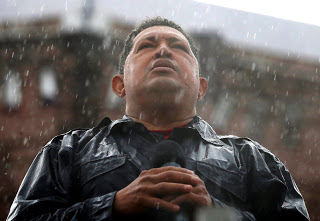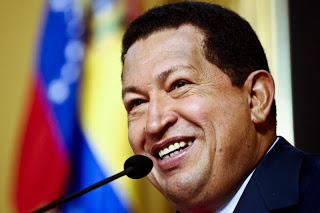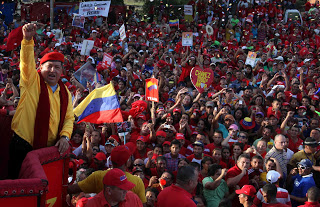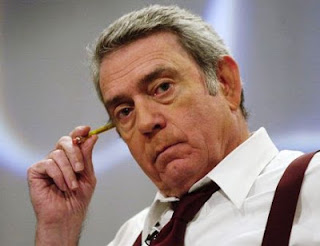By Eva Golinger
Most of what you read or hear in mass media
about President Hugo Chavez is always negative, his faults exaggerated, his
discourse distorted and his achievements ignored. The reality is quite different.
Hugo Chavez was beloved by millions around the
world. He changed the course of a continent and led a collective awakening of a
people once silenced, once exploited and ignored. Chavez was a grandiose visionary
and a maker of dreams.
An honest man from a humble background who
lived in a mud hut as a child and sold candies on the streets to make money for
his family, Chavez dreamed of building a strong, sovereign nation, independent
of foreign influence and dignified on the world scene. He dreamed of improving
the lives of his people, of eradicating the misery of poverty and of offering
everyone the chance of a better life - the “good life” (el buenvivir), as he
called it.
President Chavez made those dreams come true. During
his nearly fourteen years of governance, elected to three full six-year terms
but only serving two due to his untimely death, Chavez’s policies reduced extreme
poverty in Venezuela by more than 75%, from 25% to less than 7% in a decade.
Overall poverty was reduced by more than 50%, from 60% in 1998 when Chavez
first won office to 27% by 2008. This is not just numbers, this translates into
profound changes in the lives of millions of Venezuelans who today eat three
meals a day, own their homes and have jobs or access to financial aid.
But the dreams don’t stop there. Chavez dreamt
of a nation filled with educated, healthy people, and so he established free,
quality public education from preschool through doctoral studies, accessible to
all. In fact, for those in remote areas or places without educational
facilities, schools were built and mobile educational facilities were created
to bring education to the people. Chavez also created a national public health
system offering universal, free health care to all, with the help and
solidarity of Cuba, which sent thousands of doctors and medical workers to
provide quality services to the Venezuelan people, many who had never received
medical care in their lives.
To strengthen and empower communities, Chavez
propelled policies of inclusion and participatory governance, giving voice to
those previously excluded from politics. He created grassroots community
councils and networks to attend to local needs in neighborhoods across the
nation, placing the power to govern in the joint hands of community groups. His
vision of diversifying his nation and developing its full potential transformed
into railways, new industries, satellite cities and innovative transport, such
as MetroCable Cars soaring high into the mountains of Caracas to connect people
with their steep hillside homes and the bustling city.
The centuries-old dream of Independence hero
Simon Bolivar to build a unified “Patria Grande” (Grand Homeland) in South
America became Chavez’s guiding light and he held it high, illuminating the
path he paved. Chavez was a driving force in unifying Latin America, creating
new regional organizations like the Union of South American Nations (UNASUR),
the Bolivarian Alliance for the Peoples of Our America (ALBA) and the Community
of Latin American and Caribbean States (CELAC). These entities have embraced
integration, cooperation and solidarity as their principal method of exchange,
rejecting competition, exploitation and domination, the main principles of US
and western foreign policy.
Chavez inspired a twenty-first century world to
fight for justice, to stand with dignity before bullying powers that seek to
impose their will on others. He raised his voice when no others would and had
no fear of consequence, because he knew that truth was on his side.
Chavez was a maker of dreams. He recognized the
rights of the disabled, of indigenous peoples, all genders and sexualities. He
broke down barriers of racism and classism and declared himself a socialist
feminist. He not only made his own dreams come true, but he inspired us all to
achieve our fullest potential.
Don’t get me wrong, things are not perfect in
Venezuela by any stretch, but no one can honestly deny that they are much
better than before Hugo Chavez became President. And no one could deny that
President Hugo Chavez was larger than life.
The first time I flew on President Chavez’s
airplane he invited me to breakfast in his private room. It was just me and
him. I was nervous and felt anxious and rushed to tell him about the results of
my investigations into the United States government role in the coup d’etat
against him in 2002. After all, that’s why I was on the plane in the first
place. I had been invited to participate in his regular Sunday television show,
Alo Presidente (Hello Mr. President) to present the hundreds of declassified
documents I had obtained from US government agencies through the Freedom of
Information Act (FOIA) that exposed US funding of coup participants. The date
was April 11, 2004, exactly two years after the coup that nearly killed him and
sent the nation into spiraling chaos.
As I began pulling out papers and spreading
documents on the table that separated us, he stopped me. “Have you had
breakfast yet”, he asked. “No”, I said, and continued fiddling with the
revealing paper before me. “We can discuss that later”, he said, “for now, tell
me about yourself”. “How is your mother”, he asked me, as though we were old
friends.
A flight attendant came through the door of his
private room with two trays and placed them on the table. I quickly gathered up
the documents. “Let’s eat”, he said. I started to protest, trying to explain
that his time was so limited I wanted to take advantage of every minute. He
stopped me and said, “This is a humble breakfast, a breakfast from the
barracks, what I most love”. I looked at the tray for the first time. On it was
a small plate with an arepa, a typical Venezuelan corn patty, a few shreads of
white cheese, a couple of pieces of canteloupe and some anchovies. Beside the
plate was a small cup of black coffee. No frills and not what you would expect
on a presidential airplane.
“After all, I am just a soldier”, he added.
Yes, Chavez, you are a soldier, a glorious soldier of a dignified, proud and
kind people. And you are a maker of dreams for millions around the world.



